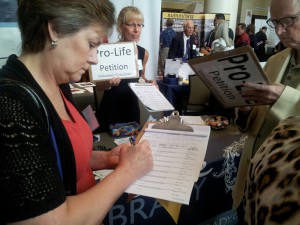Talk-show host denies that his ethics complaint against Hick is a PR stunt
Wednesday, July 31st, 2013Three weeks ago, FOX 31 aired a story about Colorado’s state-owned jet, including the fact that Gov. John Hickenlooper flew on the plane, along with businessman Ken Gart and his son, to the 2012 Pro Cycling Challenge in Durango.
The FOX 31 story wasn’t received very well.
Denver Post editorial writer Tim Hoover reviewed the story and concluded that “the ‘concerns’ outlined in the FOX 31 report were just silly.”
Editorial Page Editor Vincent Carroll concurred, tweeting:
“Nice job by Tim Hoover deconstructing an overhyped Fox 31 story on usage of a state plane.”
In his piece, “Not airworthy: FOX 31 Piece on State Airplane Usage Was Pretty Lame,” Hoover noted that Gart helped organize the USA Pro Cycling Challenge, “a large-scale, high-profile event that is important to Colorado and one a governor would be wise to attend.”
Hoover: It doesn’t seem crazy that one of the key people behind organizing the event might attend it with the governor. But in any case, the report notes Gart reimbursed the state $431 for his travel costs after FOX 31′s inquiries.
Despite this, and the fact that Hickenlooper reimbursed the state for his son’s trip, Denver talk-show host Jason Worley was so impressed with the FOX31 story that he filed a complaint Monday to the Colorado Independent Ethics Commission, in part, he said on the radio yesterday, because “nobody else wanted to do it.”
“There’s a news story backing up every bit of what I’m saying,” Worley said on the radio yesterday. “This is not a frivolous claim. We didn’t do this on a lark.”
Worley’s complaint stated that KDVR did not report when Hickenlooper and Gart paid back the state, but the station flashed Hick’s $903.75 reimbursement check for his son, and it’s dated Jan. 30, 2013. Gart’s $431 check is dated Jan. 15. That’s about four months after the trip, during the period KDVR claims it was doing its investigation, as Worley pointed out to me.
Citing an alleged precedent set in a recent Gessler case, Worley’s complaint states that “subsequent reimbursement” of funds “cannot spare a liable public official from an IEC penalty.”
Ethics Watch Director Luis Toro, however, told me via email that “Team Gessler never actually requested that the IEC drop the case based on the payment (as I fully expected they would)” and the case did not establish the precedent that “late repayment should not prevent an ethics complaint from going forward.”
[See Toro’s answers to my other questions about the case below.]
Asked by KDVR about taking his son with him to Durango, Hickenlooper said:
“The hard part about this job is I never get to spend time with my son. I feel like I’m missing his childhood. He’s about to turn 11…. We always pay his pro-rated share. So we pay the state back when he’s on there.”
“I’m glad he pays the state back for his son,” Worley emailed when asked to respond to Hick’s statement. “Not sure why it took an investigative reporter to prompt him to do so.”
In his complaint, Worley asks the state to investigate, among other things, whether Hick used the plane to take him and his guests to Durango for non-state or political business.
“I do see that this trip could have been a ‘perk’ of being Governor,” Worley emailed me. “However taking a campaign contributor means this was a least in part, questionably political. How much was business, how much was personal and how much political. Why didn’t he allocate for that as was decided in the Gessler case. It is a requirement.”
On the radio Tuesday, Worley said he plans to bring a live microphone to any ethics hearing, if one takes place, raising the question of whether this is a publicity stunt by a talk-radio host, not unlike throwing live chickens out the studio window.
“Ken and I make no bones that we are activists first,” Worley said. “No one else stepped up to file this complaint, why not me? If publicity were our main focus we’d go off and purposely say outrageous things. We don’t do that, we give our honest opinion.”
Luis Toro, Director of Colorado Ethics Watch, answered questions yesterday via email regarding Worley’s complaint to the Independent Ethics Commission:
Was it ok ethics-wise for Hickenlooper himself to use the state plane to go to the race?
I believe it is pretty standard for governors to attend high-profile events like the USA Pro Cycling Challenge. In this case, the governor is lucky to be the governor of Colorado where events like that happen in places like Telluride and Durango. Undoubtedly it is one of the better parts of his job, but one that fits very comfortably into what governors are expected to do. There is actually a specific Fiscal Rule (11.6) regarding travel by the Governor that says “In the case of travel by the Governor, security, protocol, ceremonial functions, and time demands may require considerations not accorded any other State official or employee.”
What about bringing Gart?
It’s always fair to question whether some people get better access to the governor than others. Arguably it’s worse if only those who can afford a trip on the state plane can ride with the Governor. From the stand point of the use of public resources, which is the focus of this ethics inquiry, once the governor is taking the plane to an event, the incremental additional cost to the state of more passengers is likely very small – like the additional fuel cost from that much more weight on the plane. On the other hand, it’s obviously a big benefit to Mr. Gart to be able to travel to Telluride without having to buy a private plane ticket. It’s appropriate that he reimbursed the state for the value of the flight to him.
What about bringing his son on the plane?
It’s pretty much the same analysis as for Mr. Gart. It’s not as though the state is a private carrier looking to fill every seat with a ticketed passenger. If the child didn’t come along, the seat would likely have been empty, and the flight would likely have been slightly less expensive for the state, but we are talking very small amounts of money, maybe not even measurable. On the other hand, it’s obviously a great personal benefit for the governor to get some quality time with his son. It’s appropriate that he paid the state back for this.
Does it matter that Hickenlooper and Gart reimbursed the state for the airfare (Hick for his son)?
Of course it matters a great deal. The element of personal financial gain is essential to prove an ethics violation based on misuse of public funds, but if the money is paid back, there is no personal financial gain.
If reimbursement makes a difference, then why didn’t the IEC drop the complaint when Gessler reimbursed (at least partially) his office?
I’m the one who brought the partial repayment to the attention of the IEC and asked them for guidance. It was on May 21, 2013, seven months after we filed the complaint and just a little more than two weeks before the hearing. The Chair, Matt Smith, instructed Ethics Watch and Gessler’s attorneys to get together and see if we could reach an agreement that could be presented to the IEC for approval. That’s not unprecedented – we worked out a stipulation with the Public Trustees Association of Colorado after 32 of their members accepted a free hotel night in Black Hawk that was worth over the gift ban limit. The Trustees agreed to pay the full amount of the fine and the IEC approved the stipulation at a public hearing after making some changes. In this case, Gessler’s attorneys never offered to make the whole hearing go away, and our view was that if we were going to have a hearing, we might as well try the whole case. As it turned out, Gessler was found to have improperly used not only the $1,270 he paid back at the eleventh hour, but more money as well such as the end of year “reimbursement” to himself out of the discretionary fund. So our decision to go to the hearing was vindicated. From the IEC’s point of view, I certainly understand that it would be a bad precedent to allow a public official to spend tens of thousands of dollars of public money on legal fees, only to pay the money back after months of dragging out the process and avoid the fine of double the amount of improper personal gain that is set forth in the state constitution.
Does it make any difference, in terms of how serious the IEC should take this case, that it was filed by a radio host, who could be accused of using the EIC to promote his radio show?
It shouldn’t. The state constitution says “any person” can file a complaint “asking whether” an ethics violation has occurred. If a public official has violated ethics standards, why should it matter who filed the complaint? Personally, I welcome this filing because we at Ethics Watch are often criticized for not filing this or that hypothetical complaint, but none of our critics has ever put their money where their mouth is by actually filing a complaint themselves, which is their right under the state constitution. For years, we have advocated a less adversarial process at the IEC, where the complaining party is not expected to put on a case like a prosecuting attorney. That would take the focus off the person who filed the complaint and on to what really matters, which is whether an ethics violation has occurred.
Anything else that you want to add?
I’m looking forward to seeing the process unfold. Assuming the Ethics Commission doesn’t simply dismiss the complaint as frivolous, will the Attorney General sign off on outside counsel for the Governor? Will the Governor run up a legal tab anywhere near the $122,000 Scott Gessler’s legal team billed to the state? Will he use public money to ask a court to declare Amendment 41 unconstitutional, as Secretary Gessler has done? It will be interesting to watch.




